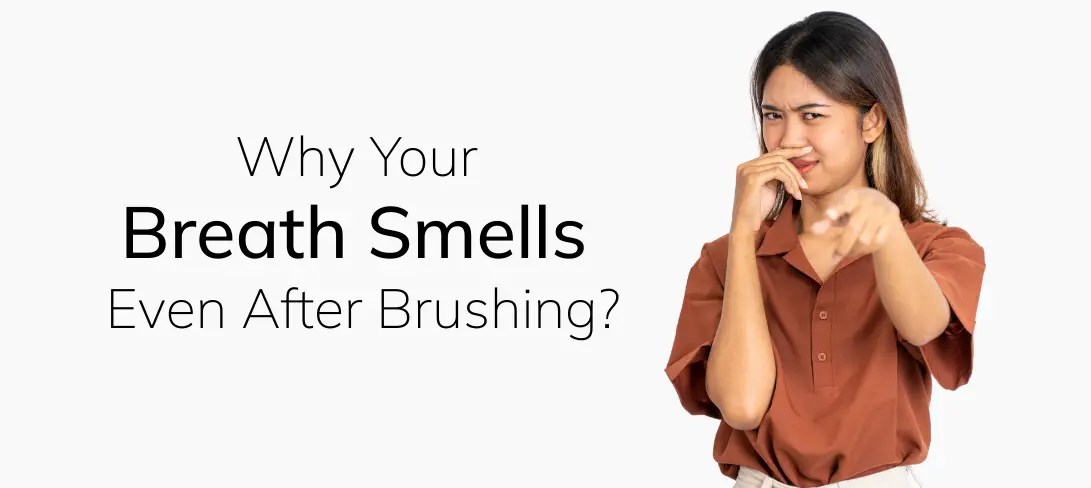Medically Reviewed By Clove Dental Team
Written By
Ravi Kumar
Last Updated 12 September 2025
Introduction
Bad breath, or halitosis, can come from more places than most people imagine. Sure, the mouth is often to blame if brushing and flossing are skipped; bacteria get comfortable on the teeth, gums, and tongue. Food can get wedged into a cavity and rot away quietly. A thick coating on the tongue can hold onto odours. Infected teeth or gums can even produce pus, and that has a smell you cannot hide.
But the mouth isn’t the only suspect; the causes of bad breath are multifactorial. Sometimes the nose or sinuses are involved: chronic sinusitis or that constant post-nasal drip can make breath turn sour. In some cases, the problem starts deeper, in the lungs, with certain respiratory diseases. Systemic illnesses change things, too. Diabetes, for example, can alter the chemical makeup of the breath itself. Even the stomach and digestion can add their own unpleasant note if food isn’t breaking down well.
So if you brush, rinse, and floss like clockwork yet still notice a stale smell, it’s worth looking beyond toothpaste. Bad breath can be stubborn because its cause isn’t always where you expect it to be.
Let’s look at what’s often ignored and what actually works when toothpaste isn’t enough.
Start With the Tongue. It’s Not Just a Pink Surface
A surprising number of people skip cleaning their tongue. But it’s one of the main reasons breath can go sour even after brushing. The back of your tongue, in particular, has lots of little grooves where bacteria settle. These bacteria break down proteins and release sulfur-smelling gases. It doesn’t matter how well you clean your teeth. If your tongue’s holding onto that stuff, your breath won’t be fresh.
Solution:
- Use a proper tongue scraper or the back of the toothbrush.
- Scrape gently from back to front a few times.
- Do it once in the morning. You’ll notice the difference in days.
Dry Mouth Is an Invisible Culprit
You may not feel your mouth is dry, but if you’re not producing enough saliva, things can smell off fast. Saliva helps clear away food particles and keeps bacteria in check. Without saliva, bacteria thrive, and bad breath follows. Mouth breathing, dehydration, stress, and many medications reduce saliva production without you even realising it.
Solution:
- Drink more water.
- Ditch alcohol-based mouthwashes.
- Try chewing sugar-free gum.
- If it’s constant, talk to your dentist; they might suggest artificial saliva or other options.
Your Gums Matter Even If They Don’t Bleed
When was the last time you flossed properly? Plaque and bacteria between teeth and below the gumline are huge sources of odour. You can’t brush those areas effectively. If left alone, they cause gum inflammation or infection. Both smell bad.
Solution:
- Floss daily.
- Water flossers help, too.
- Get your teeth professionally cleaned at least twice a year.
Tonsil Stones
If your tonsils have deep folds, they may trap debris that hardens into little white chunks. These are tonsil stones, and they can cause bad breath. They’re made of dead cells, mucus, and bacteria. Some people have them without realising until one dislodges and releases that foul smell.
What helps:
- Gargle with warm salt water.
- Some people use cotton swabs gently.
- If they’re frequent, an ENT doctor might need to help you manage them.
The Stomach Can Cause Issues
If you’re brushing and flossing but still getting that foul or sour breath, it may not be your mouth. Acid reflux pushes stomach contents up toward the throat. That acidic taste and smell can linger even after you brush. Some digestive conditions also release unusual breath odours due to metabolic changes.
Solution:
- Try having smaller meals.
- Avoid spicy or acidic foods.
- See a doctor if it persists.
Food That Fights Back Long After You Eat
Garlic and onions are classic offenders, but the issue goes beyond that. These foods get absorbed into your bloodstream and release odour through your lungs, not your mouth. High-protein diets can also cause a strange, almost fruity smell due to ketones being released during fat breakdown.
Solution:
- Hydrate well.
- Snack on crunchy fruits or parsley.
- Rinsing alone won’t help; this one comes from inside.
Smoking
If you smoke or chew tobacco, it’s not just a breath issue. It’s a full-system issue. Tobacco dries your mouth, stains your teeth, and promotes gum disease. Even if you brush three times a day, that deep odour stays because of chemical residues and tissue damage.
Hard truth: Quitting is the only real solution. Nicotine patches, counselling, and even support groups can help. The difference in your breath and health will be worth it.
Dental Devices
Wearing a retainer or aligner? If you don’t clean it properly, it becomes a bacterial playground. These devices trap food and moisture, especially when worn for hours. If your breath is only bad when you’re wearing them, this might be the cause.
Solution:
- Clean them daily outside your mouth.
- Use the solution your dentist recommends, not toothpaste.
- Rinse them after meals.
Sometimes the Issue Runs Deeper
Occasionally, bad breath can signal a medical issue: diabetes, kidney problems, or liver disease. Each of these can affect the way your breath smells. If you’ve cleaned your mouth thoroughly, changed your diet, and still notice an unusual odour, it might be time to look beyond oral health.
Solution: Talk to your doctor, especially if there are other symptoms like fatigue, digestive issues, or unusual thirst.
Daily Plan That Actually Works
Morning
- Scrape your tongue before brushing
- Brush for two full minutes
- Floss
Daytime
- Stay hydrated
- Chew sugar-free gum between meals
- Watch for triggers like strong foods or dry mouth
Evening
- Clean dental devices thoroughly
- Floss again if needed
- Brush and rinse before bed
- Sleep with your head slightly elevated if you suffer from reflux
Bottom Line. Fresh Breath Is a Whole-Mouth and Whole-Body Effort
Brushing is essential. But breath comes from more than just your teeth. The tongue, throat, gums, diet, hydration, and even digestion all play a role. Once you start thinking about breath as a system rather than a quick fix, you’ll see longer-lasting results, and you’ll feel a lot more confident when you speak up close.
So next time your breath smells off even after brushing, don’t reach for more mint. Step back. Look at the bigger picture. That’s where the real solution usually is.

